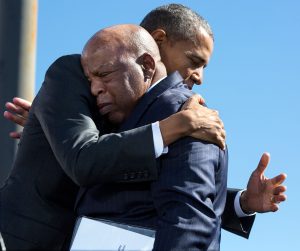
The loss of Representative John Lewis in July 2020 has left many Atlantans with a hurt that has not gone away. We miss seeing him because he was often seen around town, especially downtown. He was so approachable, and many of us had had personal conversations with him.
There are several excellent federal government websites you can use to get your John Lewis fix, to ease missing him, and help you find inspiration to face your own challenges.
One I particularly like was written by 2013-2015 Teacher in Residence at the Library of Congress, Rebecca Newland, a public school librarian of Fairfax County. It's a nicely written, personal essay, opens a new window that brings Lewis to mind for me.
In her July 19, 2020 posting, opens a new window, Librarian of Congress Carla Hayden remembered of Lewis "his gentle temperament kept you at ease".
Especially fascinating is the Selma, Edmund Pettus Bridge FBI Case File, opens a new window, a blog post written on the occasion of the release of the movie Selma. It includes images of the statements FBI agents took from Lewis, national chairman at the time of the Student Nonviolent Coordinating Committee (SNCC), and other marchers who were assaulted on the Edmund Pettus Bridge. The details of the grim attacks on the marchers are sobering to read.
The John F. Kennedy Presidential Library, opens a new window also has primary source material by and about John Lewis, who in his capacity as head of the Student Nonviolent Coordinating Committee (SNCC) corresponded and met with Kennedy several times.
Many other archived materials are available at the National Archives Eyewitness page, opens a new window. It displays digitized pages from a hearing resulting from the March 7, 1965, march from Selma to Montgomery in support of voting rights. These pages reside in the National Archives building in Morrow, Georgia, opens a new window. You can make an appointment to view them in person.
Finally, nobody should be writing a school report without seeing all the resources at the National Archives' page dedicated to John Lewis, opens a new window. This is a multimedia collection of records depicting Lewis from several sources, including footage of the 1963 March on Washington.
At a conference on the occasion of the 50th anniversary March on Washington organized by the Kennedy Library, Lewis said
"People ask me whether the election of Barack Obama is the fulfillment of Dr. King's dream. I say, no, it's just a down payment. There are still too many people, 50 years later, there are too many people that have been left out and left behind. They're black. They're white. They're Latino. They're Asian American and Native American. If Dr. King could speak to us 50 years later, he would say we are one people, we are one family. We all live in the same house, the American house."



Add a comment to: Remembering John Lewis in Government Documents